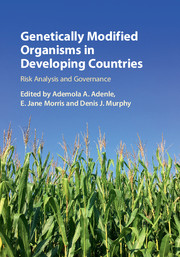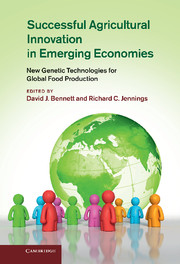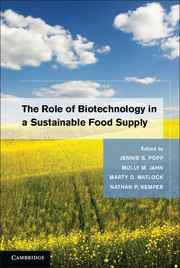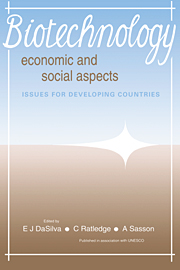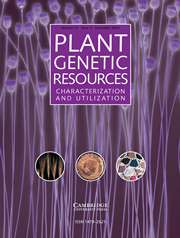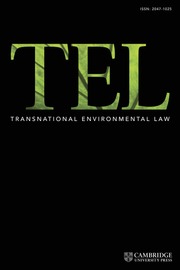Genetically Modified Organisms in Developing Countries
Bringing together the ideas of experts from around the world, this incisive text offers cutting-edge perspectives on the risk analysis and governance of genetically modified organisms (GMOs), supporting effective and informed decision-making in developing countries. Comprised of four comprehensive sections, this book covers: integrated risk analysis and decision making, giving an overview of the science involved and examining risk analysis methods that impact decision-making on the release of GMOs, particularly in developing countries; diversification of expertise involved in risk analysis and practical ways in which the lack of expertise in developing countries can be overcome; risk analysis based regulatory systems and how they can be undermined by power relationships and socio-political interests, as well as strategies for improving GMO policy development and regulatory decision-making; and case studies from developing countries providing lessons based on real-world experience that can inform our current thinking.
- Includes real-world examples and case studies from developing and developed countries that have made progress in the introduction of genetically modified organisms (GMOs), providing practical learning opportunities for readers
- Identifies specific hurdles that are impeding the development of effective systems of governance of GMOs and outlines a set of actions that will enable developing countries to move forward
- Provides clear information on the potential of GMOs without scientific jargon, meaning that readers without a technical background can benefit from the text
Product details
June 2017Hardback
9781107151918
320 pages
254 × 178 × 29 mm
0.8kg
23 b/w illus. 16 tables
Available
Table of Contents
- 1. Introduction Ademola A. Adenle, E. Jane Morris and Denis J. Murphy
- 2. Recent scientific developments in genetic technologies: implications for future regulation of GMOs in developing countries Denis J. Murphy
- 3. A strategy for integrating science into regulatory decision-making for GMOs Wendy Craig, Dennis Ndolo Obonyo and Mark Tepfer
- 4. Governance of benefits and risks of GMOs in developing countries E. Jane Morris
- 5. The Canadian experience with the creation and implementation of regulatory frameworks for the environmental release of GM crops as a model for developing countries Phil Macdonald
- 6. Labelling of food from GMOs: options to consider by developing countries Wilna Jansen van Rijssen and Wynand J. van der Walt
- 7. Building human capacity and skills in biosafety: lessons learned and emerging best practices John Komen and Muffy Koch
- 8. Regulation of GMOs in developing countries: why socioeconomic considerations matter for decision-making Jose Falck-Zepeda and Marnus Gouse
- 9. Food safety assessment of genetically modified crops in developing countries: the experience in Africa Godwin Lemgo, Narender Nehra and Hector Quemada
- 10. Being scientific about socio-economics in GMO decision-making in developing countries Monica Racovita
- 11. The sharing of information in risk assessment: how national authorities co-operate Peter Kearns, Bertrand Dagallier and Takahiko Nikaido
- 12. Should GM rice with nutrition benefits be deployed? Findings from biotech and socio-economic research Hans De Steur, Dieter Blancquaert, Christophe Stove, Willy Lambert, Dominique Van Der Straeten and Xavier Gellynck
- 13. The risk analysis framework and biosafety policy Peter W. B. Phillips and Stuart J. Smyth
- 14. Precautionary principle as a barrier to GMO risk analysis: Elicitation of experts' viewpoints Ademola A. Adenle
- 15. How do socio-political disputes of GMOs influence decision-making in developing countries? Hossein Azadi, Ademola A. Adenle and Klaus Ammann
- 16. Biosafety communication: beyond risk communication Andrea Sonnino and Sandra Sharry
- 17. The role of mass media and lobbies in the formulation of GMO regulations Mauro Vigani
- 18. Risk regulation of agricultural GMOs in China: challenges and prospects Wen Xiang
- 19. Commercial use and governance of Bt cotton in China Yunhe Li, Yanhui Lu, Eric M. Hallerman, Yufa Peng and Kongming Wu
- 20. Regulatory regime of genetically modified crops in India Krishna Ravi Srinivas
- 21. The Argentinian GMO biosafety system: an evolving perspective Carmen Vicien and Eduardo Trigo
- 22. The Brazilian GMO regulatory system: a historical view and perspective Edivaldo Domingues Velini, Maria Lúcia Zaidan Dagli, Gutemberg Delfino de Souza, Rubens José Nascimento, Tassiana Fronza Pinho, Paulo Paes de Andrade and Helaine Carrer
- 23. Effective regulatory regime supported by research and development is key to adoption of GM technology in West Africa: Burkina Faso and Nigeria as case studies Olalekan Akinbo, Ademola A. Adenle and Diran Makinde
- 24. Pathway for biosafety regulation of GMOs in Sub-Saharan Africa Julius Ecuru
- 25. Conclusions and recommendations E. Jane Morris, Ademola A. Adenle and Denis J. Murphy.

